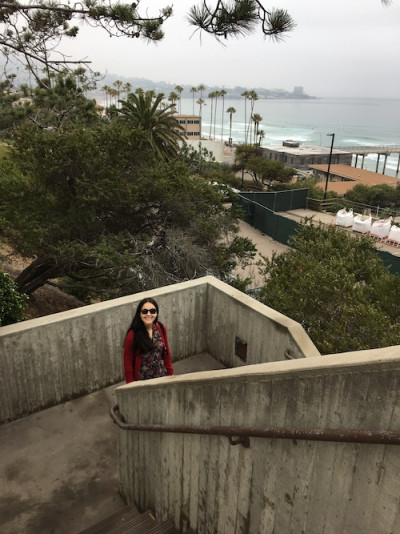One of the best pieces of advice Camila Pauda ever received was given to her by a retired marine biologist. Pauda grew up in Salinas, a half-hour from the coast, and always felt driven by a love for and curiosity about the ocean. So much so that in high school she volunteered at the Monterey Bay Aquarium as a teen conservation leader. “But I wasn’t sure what to do next, how to share this love for the ocean,” says Pauda. The marine biologist, a fellow volunteer, told her: Get a broad undergraduate degree, then find a job and explore.
So Pauda studied ecology at the University of California, San Diego. After, she interned at the U.S. Navy Marine Mammal Program, worked at a dog daycare, became an AmeriCorps Discovery Fellow at the Ocean Discovery Institute in San Diego and put in a stint as an instructor at the Birch Aquarium at Scripps in La Jolla.
After several years, Pauda realized that she wanted to know more about policy, particularly climate policy, and decided to go back to school. In 2022, she obtained a Master’s degree in Climate Science & Policy from Scripps Institution of Oceanography before becoming a California Sea Grant State Fellow at the California Coastal Commission. As a state agency, the Coastal Commission is charged with protecting the state's 1,100-mile coastline by regulating development, ensuring public access to beaches and addressing environmental concerns.
“I like it when a lot of things come together”

Pauda worked with the Commission’s statewide planning unit on topics that ranged from smart growth, environmental justice and offshore wind to pollution and nature-based adaptation strategies, such as restoring dunes to protect coastal infrastructure. She enjoys how policy work connects many different elements. “Not just ocean science or marine biology, but also people and social sciences — trying to figure out how to harmonize everything,” she says. “I come from a family of jacks of all trades, and I consider myself one too, the opposite of a specialist. I like it when a lot of things come together.”
After Pauda’s fellowship ended last March she stayed at the Commission, accepting a job as a coastal program analyst. She now spends her days reviewing coastal development permits in the San Diego area. It has changed how she views her beloved ocean. “When I go to the beach I notice things I never noticed before. Like sea walls or how close some houses sit to the bluff,” says Pauda.
But her work has also shifted her perspective on a deeper level. Learning about climate policy in college, she often found herself overwhelmed. “There was all this doom and gloom and a desire to see immediate results,” says Pauda. Now when she reviews permits to repair a house or a trail, she often consults the original paperwork, which might date back twenty or thirty years. The practice has taught her to take a longer view. “Reminding yourself not to get discouraged is crucial,' she advises. “Just keep on doing the work. The effort will pay off in the end.”
About California Sea Grant
NOAA’s California Sea Grant College Program funds marine research, education and outreach throughout California. Headquartered at Scripps Institution of Oceanography at the University of California San Diego, California Sea Grant is one of 34 Sea Grant programs in the National Oceanic and Atmospheric Administration (NOAA), U.S. Department of Commerce.